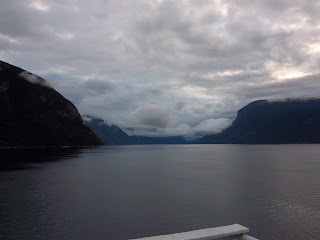Before traveling to Scandinavia, I wondered how the Danes
and Norwegians always appeared in worldwide polls as the happiest people in the world with the greatest
overall sense of well -being. They live in a place with long, cold,
dark winters even worse than Chicago’s. On our trip, I found out.
Yes, they have beautiful places where they can enjoy the
outdoors. The fiords and mountains were spectacular to see. We heard from our
guide that most Norwegians live for their opportunities to be outdoors skiing and
otherwise enjoying their beautiful mountains.
There has to be more to their secret of national happiness
than the beautiful scenery and there is. Norway has an extremely admirable
social safety network. National healthcare is virtually free to all Norwegians. The
government pays for daycare and most Norwegian women work outside the home.
They get a 47- week paid parental leave. What can you say to that besides
“Wow!”?
All laws are gender-neutral and in many families, the father
is the one to stay home. After the leave, the parent has the option of working
part-time. Those women who don’t work
are looked down upon by most of Norwegian society. The unions set the wage
scales and the least anyone makes is $20 per hour. Of course, school through
University is free.
Any Norwegian who has worked 40 years gets a pension worth about two thirds of his (her) salary starting at age 62. Anyone who has worked less than that can work until age 67 and get part of that amount. If someone needs to go to assisted living when he (she) is elderly, he (she) pays 80% of his (her) pension check and their government pays the rest.
Any Norwegian who has worked 40 years gets a pension worth about two thirds of his (her) salary starting at age 62. Anyone who has worked less than that can work until age 67 and get part of that amount. If someone needs to go to assisted living when he (she) is elderly, he (she) pays 80% of his (her) pension check and their government pays the rest.
Norwegians are taxed heavily to pay for this generous social
safety net. As a result, no one there is extremely wealthy. People there pride themselves on having a more equal society. If you want to
become uber-rich, don’t go there. In Oslo, I was impressed when we were told to
visit their most prominent, wealthy hotel. It was very nice, but I was
impressed by how unimpressive it was. The Palmer House in Chicago is much
ritzier. If you want to live in a society where everyone has at least the
basics and nobody is homeless, Norway is the place to go. Most Norwegians will
accept you as long as you work, learn to speak Norwegian, and try to fit into
the norms of their society.
Of course, a social safety doesn’t prevent all problems.
People can still become physically or mentally ill or develop addictions. They
can still have family problems, disabilities, or other emotional difficulties. Nevertheless, I
think how much easier it would have been for my former clients’ issues to be
resolved had their lives been stabilized by such a safety net. We can certainly
learn from the Scandinavians in this respect. In a way, it’s what my book Breaking
the Fall is all about.







No comments:
Post a Comment